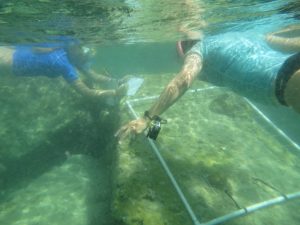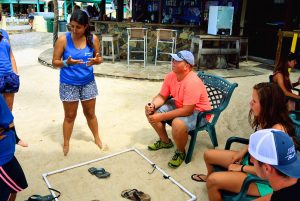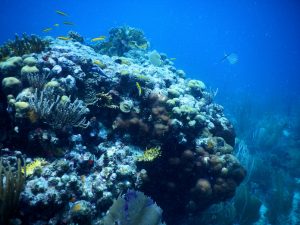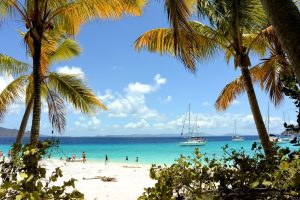This Island Times blog was contributed by Ally Marter, a Lead member of our SeaTrek BVI marine biology team. Ally has been with SeaTrek for 4 years as a student, ShIP intern, and now as our Lead Biologist. She’s also a SeaTrek/NAUI Divemaster!
With a post card-perfect image such as this one (taken on Sandy Cay), it’s easy to see why students love spending time with us at SeaTrek BVI in the beautiful British Virgin Islands. However, the British Virgin Islands are so much more than just white sand beaches and palm trees. There’s an amazing assortment of diverse ecosystems, above and below the Caribbean blue waters. By further understanding the depth and interdependence of these spectacular ecosystems within the islands, we help our students fall in love with this environment even more. Through the hands-on marine science program at SeaTrek, that’s exactly wha students gain: a better appreciation and understanding of the natural world that surrounds them.
Coral reef ecosystems display some of the best visual examples of the interplay and complexities of life in the ocean. Not only are they comprised of the thousands of individual coral polyps themselves (animals), but of the physical structure (calcium carbonate – hard mineral exoskeleton) and symbiotic zooxanthellae algae (plant-like). Beyond just the corals, the reefs serve as habitat for an array of other interdependent species including: sponges, echinoderms (like sea stars and urchins), mollusks, fish, crustaceans, reptiles, marine mammals, and more! There are over 350,000 acres of coral reef in the BVI alone.

Students practice coral monitoring techniques with a quadrat underwater on snorke
Including benefitting the species that call them home, the reefs serve important environmental and economic value to the people of the BVI, acting as shoreline stabilization, and helping fuel the large local tourism and fishing industries. The corals themselves, and the delicate balance of relationships with other species they form are fragile and easily affected by the threats they face. Among the natural threats posed are competition, predation, and disease. Much more imposing, though, is the long list of human related threats such as pollution, runoff/ sedimentation, coastal development, overfishing, climate change (rising temperatures cause coral bleaching), and recreational use.

Students are introduced to coral monitoring principles and do a dry run on shore at Leverick Bay, Virgin Gorda
At SeaTrek, we teach the students about these kinds of threats to the reefs, and then they observe these prevalent impacts first-hand through diving and snorkeling. What’s more, they have the chance to take action in preventing some of these threats. For example, we hold them to very high standards of diving, teaching them to focus on excellent neutral buoyancy control and trim through the water. This prevents detrimental actions such as kicking coral or stirring up excess sediment which can smother corals.
SeaTrek BVI also offers a variety of marine science activities and projects for students to practice citizen science, contributing to monitoring of reef health. Students who express interest are introduced to coral monitoring principles and techniques, using field science tools such as transects and quadrats.

A beautiful scene of BVI corals with a lone bar jack looming in the background
Along with a greater understanding and appreciation of coral reef ecosystems in the BVI, students also gain a sense of ownership and responsibility. The most important part about enabling students to fall in love with coral reefs, is that they’ll ultimately be motivated to protect these unique environments. As lead biologist, that’s the most satisfying and comforting part of my job: that I have the privilege to be a part of creating a newer, larger generation of ocean lovers who will help preserve it for years to come.
If you would like to learn more about our marine science program at SeaTrek BVI, check out our website page HERE. For more resources on coral reef ecology, check out the BVI Marine Awareness Guide or NOAA’s website.





